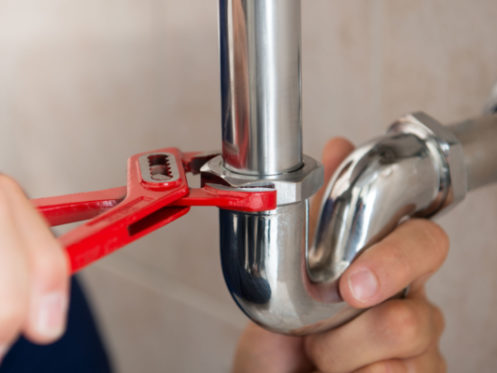As the temperatures drop, it’s essential to take steps to protect your home from winter plumbing issues. From faucets to pipes, several potential problems come up during the coldest months of the year. To help you stay one step ahead of any plumbing nightmares, here is a list of the nine most common winter plumbing problems and tips on how to avoid them.
1. Frozen Pipes
Winter has a way of wreaking havoc on your plumbing, with frozen pipes being one of the most common issues. Common causes of frozen pipes in the winter are drastic changes in temperature, poor insulation, single-paned windows, and pipes located near exterior walls. Homeowners can take action to prevent frozen pipes by adding insulation around them, wrapping them up at night, and keeping the thermostat above 55 degrees, Fahrenheit while away.
If you find yourself with any degree of frozen pipes, don’t wait too long to call a professional plumber. They’ll be able to assess the severity of the situation, thaw out your pipe if necessary, and determine underlying reasons for why the freeze occurred so that solutions can be implemented to prevent future issues from popping up.
2. Low Water Pressure
Low water pressure can be one of the biggest dampeners to beat winter blues; nobody wants to wash their dishes with barely a trickle! Unfortunately, low water pressure is a common plumbing problem that homeowners often face during winter. In most cases, when pipes freeze due to extremely low temperatures and then thaw. This causes air bubbles which block the flow of water, resulting in lower than usual water pressure. Homeowners should ensure that their pipelines are properly insulated and enclosed – this can drastically reduce the chances of experiencing this issue.
Moreover, expert plumbers can install thermal insulation sleeves around existing pipes to prevent them from freezing. If your home suffers from low water pressure despite such measures, then calling in a professional plumber is highly recommended. They will be able to locate any underlying issue causing the low pressure by testing each faucet as well as the shut-off valves. Then, the technician can make any repairs or even replace the pipe.
3. Clogged Drains
When temperatures drop below freezing, any grease and other debris already sitting in drainpipes can freeze into a blockage – these blockages can cause the inevitable chaos and mess to your kitchen, bathroom, and laundry room. To avoid this unfortunate and time-consuming issue, implement simple preventive measures such as putting strainers on all sinks and tub drains. Remember to avoid pouring grease down any drains no matter what time of year it is – this will only add to your plumbing problems over time.
4. Leaking Faucets
There are several reasons faucets may start to leak in winter: water inside the pipes crystallizes when temperatures drop below freezing; seals around gaskets and washers generally weaken with age; and the expanding and contracting of metal parts due to changing outdoor temperatures can cause wear, tear, or loosening of parts. Fortunately, these problems are not too difficult for professional plumbers to fix. They have access to specialized tools and repair kits that allow them to quickly diagnose the problem and replace faulty or damaged parts.
5. Running Toilets
Running toilets are an all-too-common plumbing problem in the wintertime, caused by sections of your toilet’s internal mechanisms contracting due to cold weather. As the temperature drops, different parts of your toilet can become more rigid and unable to move freely. This can cause a running toilet as sections of the flush valve struggle to open and let water flow through. To fix a running toilet in the wintertime, it is best to contact a professional plumber who is experienced in these issues.
6. Sump Pump Backup
Sump pumps are designed to remove any accumulated water from the area around your home foundation, but malfunctions do happen when the weather is cold. Fortunately, some measures can be employed to ensure that such a disaster does not occur. One of the main causes for sump pump backup during winter is ice and snow accumulation at or near sump pump drain pipes.
When these freeze over, it prevents the flow of necessary water from leaving or entering properly. To mitigate this problem, homeowners need to make sure that all their outside plumbing system drains, and pipes are clear and free of clogs, as well as insulated adequately for temperature protection.
7. Outdoor Drain Damage
Outdoor drain damage can be a devastating problem in the winter months. It is important to act and be aware of what causes such damage. Left unaddressed, this plumbing issue can result in costly repairs as well as problems with irrigation systems as well. Generally, outdoor drain damage occurs when temperatures drop drastically, which creates the perfect environment for water to freeze inside pipes or drains.
This freezing process creates an expansion that puts intense pressure on surrounding components and weakens the structure of these elements, resulting in cracks and other forms of damage. A broken drainpipe can also lead to overflowing drains in your yard after a heavy snowfall or a powerful storm with strong winds. Taking preventative measures to protect your outdoor pipes from extreme temperatures is essential in avoiding this potentially catastrophic plumbing issue.
8. Frozen Well Pumps
Frozen well pumps are an unfortunately common winter plumbing problem, particularly in areas with harsher winters. The freezing temperatures of these environments can cause the water pump to freeze, leading to all kinds of damaging consequences, including broken and lost parts, expensive repairs, and no access to running water.
One of the primary causes of a frozen well pump is a lack of insulation. Without proper coverage around the pipes that feed into the well (and potentially even around the well itself), cold air has easy access to your system and easily reduces its temperature until it freezes over.
9. Flooding Basements Due to Melting Snow
A flooding basement due to melting snow is not only annoying and disruptive but also seriously dangerous. Left unchecked, it can lead to mold formation and water damage. Moreover, it may also cause water to continuously seep into your basement for weeks or even months until the snow finally melts.
If not managed properly and promptly, the weakening structure of a home may be compromised beyond repair. To avoid this potential disaster, homeowners must take preventive measures like cleaning their gutters regularly and making sure downspouts are properly directed away from their foundation to safeguard against freezing or inadequate drainage that can lead to flooding.
Contact Professionals Today!
At True Climate Heat + Air, we are dedicated to offering unbeatable heating, cooling, and air quality services to the greater Oklahoma City metro area. If you need any of these services, including plumbing fixes, we can help. Our main goal is your ultimate satisfaction and peace of mind knowing that the job was done right. Our team is confident in our experience, delivering quality services to turn your living space into a vibrant and comfortable environment. With 24/7 emergency services available, you can rest assured that you will never be left without help when it comes to your comfort needs. Call True Climate Heat + Air today to schedule a consultation.


